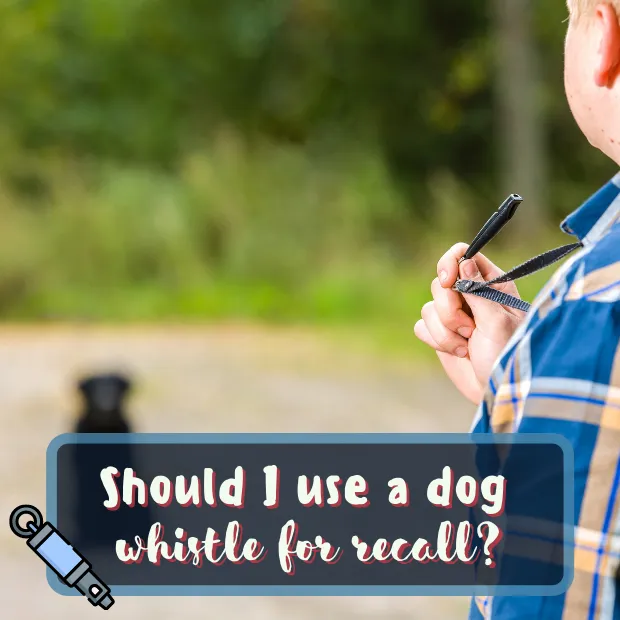When it comes to dog training, there are a lot of different methods and tools that can be used.
One of the most common tools is a dog whistle. But does a dog whistle work for recall? And if so, how do you use it effectively? How do you train a dog to recall with a whistle? Is a dog whistle really necessary?
In this post, we’ll take a look at whether or not using a dog whistle for recall is effective and provide some tips on how to use one properly.
Table of Contents
ToggleContents of this article:
- What is a dog whistle and how does it work?
- Are dog whistles okay?
- Pros and cons of using a dog whistle for recall.
- How to use a dog whistle for recall.
- When should you introduce a puppy to a whistle?
- Is a dog whistle necessary for recall?
- Troubleshooting tips if your dog is not responding well to the whistle.
- Other ways you can train your dog to come when called.
- Should I use a dog whistle for recall? – Conclusion
What is a dog whistle and how does it work?
A dog whistle is a tool that emits a high-pitched sound. Some dog whistles are above the range of human hearing although dogs can hear these frequencies, which is why they are often used as a training aid. The sound of the dog whistle can be used to get a dog’s attention and to give commands or cues.
Are dog whistles okay?
Dog whistles that are within the range of human hearing can be loud and annoying, which can be disruptive to not only you and your family but also your neighbours. It’s important to be considerate when using a dog whistle.
Pros and cons of using a dog whistle for recall.
Benefits of using a dog whistle for recall.
- One of the main benefits of using a dog whistle for recall is that it can help you get your dog’s attention from a distance. This can be helpful if your dog is distracted or if there is a lot of noise.
- Another benefit of using a dog whistle is that you can use it to give commands or cues without having to shout.
- The whistle is a unique and consistent sound. This is useful because it doesn’t vary like our voices do.
- Dog whistles can also be used to give commands or cues, such as to come, sit, stay, or down.
Downsides to using a dog whistle for recall.
- One of the main drawbacks is that it can be difficult to get your dog to respond to the whistle if they are not already familiar with it. It’s important to train your dog to respond to the sound of the whistle before you try to use it for recall.
- Additionally, dog whistles can be annoying for you, your dog and people around you if used excessively.
- Some dogs may be afraid of the sound of the whistle or may associate it with negative experiences if it has not been introduced properly.
- If your dog’s recall is reliant on the whistle and you lose it or forget to take it out with you, then you may have a problem.
Because of these reasons, I like to teach a verbal recall as a higher priority. For information on how to teach a recall on a verbal cue, check out this post.
How to use a dog whistle for recall.
When using a dog whistle for recall, it is important to start by teaching your dog the meaning of the sound. This can be done by blowing the whistle and then giving your dog a treat.
Once your dog knows that the sound of the whistle means he will get a treat, you can start using it to get his attention from a distance.
When should you introduce a puppy to a whistle?
You can introduce a puppy to a whistle as early as 8 weeks old.
Start by getting your puppy used to the sound of the whistle by blowing it before giving them their meal or before a play session. This creates a positive association with the sound of the whistle.
Once your puppy is used to the sound, you can start using it to get their attention and give commands.
It is important to be consistent with using the whistle and to use a happy and excited tone of voice when calling your dog.
Is a dog whistle necessary for recall?
A dog whistle is not absolutely necessary, but it can be a helpful tool, especially if you need to get your dog’s attention from a distance. If you decide to use a dog whistle, make sure to use it properly and consistently so that your dog can learn the meaning of the sound.
Troubleshooting tips if your dog is not responding well to the whistle.
If your dog isn’t responding well to the whistle, there are a few troubleshooting tips you can try:
- Make sure you are teaching your dog the meaning of the sound.
- Use a happy and excited tone of voice when calling your dog.
- Don’t use the whistle for punishment.
- Be consistent with using the whistle.
- Try a different type of dog whistle.
If you follow these tips and your dog still isn’t responding well to the whistle, it may be best to consult with a professional trainer for help.
Other ways you can train your dog to come when called.
In addition to using a dog whistle, there are other ways you can train your dog to come when called. These include using a clicker, treats, and verbal cues. You can also try playing fetch or recall games with your dog.
Should I use a dog whistle for recall? – Conclusion.
The answer to this question is not a simple yes or no. It depends on your dog’s personality and the situation in which you will be using the whistle.
If you have a well-trained dog who responds consistently to verbal commands, then a dog whistle may not be necessary. However, if your dog is easily distracted or has trouble responding to verbal commands, then using a whistle can help him focus and come back to you.
Ultimately, it is up to each individual owner to decide whether or not they need a dog whistle for recall.
Check out this post if your dog’s recall could do with some help!!







